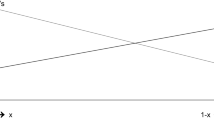Abstract.
We face the problem of allocationg a fixed amount of a perfectly divisible good among a group of agents with single-peaked preferences. We survey the three different cases studied in the literature: the pure distribution case, the redistribution case, and the gerneral case. The so called general case provide with a natural framework to analyze the idea of path-independence. In this framework, we explore the existence of rules fulfilling this property. Our first result is negative: a strong version of this property cannot be fulfilled together with efficiency. Nonetheless, some restricted versions of the path-independence property are compatible with interesting properties, in particular no manipulability, and no envy. We then identify two solutions satisfying this sort of property: the equal distance rule, and a new extension of the uniform rule.
Similar content being viewed by others
Author information
Authors and Affiliations
Rights and permissions
About this article
Cite this article
Herrero, C. General allocation problems with single-peaked preferences: path-independence and related topics. Span Econ Rev 4, 19–40 (2002). https://doi.org/10.1007/s101080200038
Issue Date:
DOI: https://doi.org/10.1007/s101080200038



